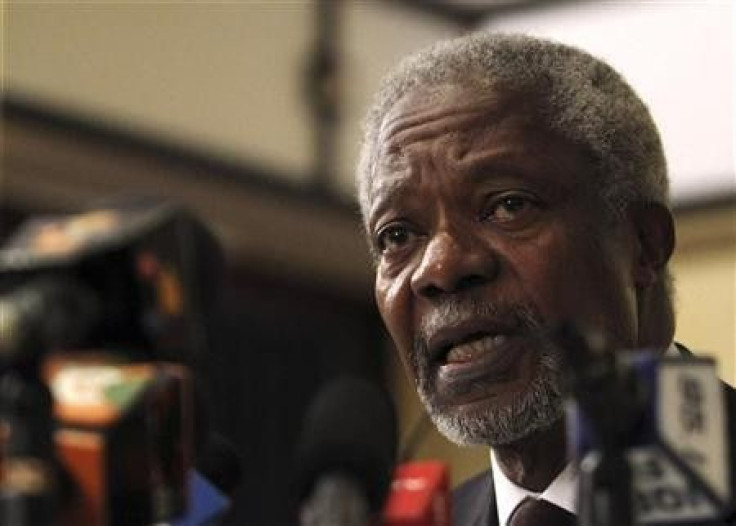Kofi Annan Warns Syria At Risk Of Civil War If Peace Plan Fails

Speaking to reporters after a meeting with Security Council members in Geneva on Tuesday, international envoy Kofi Annan gave an alarming assessment of the situation in Syria.
I believe that the UN supervision mission is possibly the only remaining chance to stabilize the country, he said. I'm sure I'm not telling you any secret when I tell you that there is a profound concern that the country could otherwise descend into full civil war.
His prediction followed a similar statement by United Nations Secretary-General Ban Ki-moon. We are in a race against time to prevent full-scale civil war -- death on a potentially massive scale, said Ban on Tuesday morning.
Syria has been embroiled in a violent conflict since March 2011, following brutal government crackdowns on civilian protests. Syrian President Bashar al-Assad has suppressed the rebellion, sending military tanks and troops to squash uprisings in several cities across the country.
The resistance has formed a loosely-organized Free Syrian Army, which includes some defectors from the regular Syrian Army. The stand-off between Assad's formidable military and a steadfast resistance movement has grown increasingly severe over the past 14 months.
Annan's peace plan was jointly agreed to by the Assad regime and representatives of the Free Syrian Army on March 27. Its ceasefire provision, implemented on April 12 and broken almost immediately, is still nominally in place so that the six-point plan can move forward.
There are currently about 50 UN monitors in Syria; a full team of 300 is expected to be on the ground by the end of this month.
Annan reports that there has been some decrease in the military activities, but there are still serious violations.
On Tuesday alone, at least 17 more people lost their lives in Syria and explosions were reported in Damascus, Homs and Hama, according to CNN.
In total, the U.N. estimates that over 9,000 people have been killed since the violent crackdowns began last year.
In Geneva on Tuesday, Syrian Ambassador to the United Nations Bashar Jafari blamed the continuing conflict on foreign intervention, echoing Assad's stated position. He argued that although the regime is committed to the success of the peace plan, the Syrian government cannot do the job all alone.
Jafari alleges that the rebels' terrorist acts were being financially supported by countries including Turkey, Qatar and Saudi Arabia.
Annan's six-point peace plan, on the other hand, is careful not to assign blame to any single party. It includes directives for the Syrian government to speed up the release of political prisoners, provide humanitarian assistance and allow free movement for journalists. It does not outline a long-term strategy for stability, and international powers are divided on how best to solve that problem.
Many observers, including Qatar, Saudi Arabia and some Western politicians, have called for immediate military intervention to oust Assad. Critics of this strategy worry that military assistance would only intensify the conflict, and that rushing to support a broad and loosely-structured resistance movement would eventually endanger minority groups within the country.
But if the UN peace plan represents the best alternative to military intervention, Annan's recent statement suggests a dire lack of options if the plan fails.
The implication of that is quite frightening, he said. We cannot allow that to happen.
© Copyright IBTimes 2024. All rights reserved.












